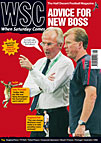 England always struggle with penalty shootouts but, as Ben Lyttleton explains, the more professional approach of others is leaving them ever further behind
England always struggle with penalty shootouts but, as Ben Lyttleton explains, the more professional approach of others is leaving them ever further behind
Paul Robinson began the World Cup accused of trying to make one of his clearances hit the giant box of video screens that hung over the centre-circle of the stadium in Frankfurt. He ended the competition staring far too often at the same screens, this time at the stadium in Gelsenkirchen, as each Portugal player walked 40 yards to take a penalty in the shootout that ultimately knocked out England.
The screens were showing images being beamed across the world but, by looking at them before the most important moments of his career, what was Robinson hoping to achieve? His opposite number, Ricardo, a penalty specialist, was not even watching his own team-mates’ spot-kicks: he was focusing on his next save. The sight of Robinson, eyes looking upwards and watching himself on the screen, can hardly have intimidated his opponents.
Sven-Göran Eriksson has been criticised for everything, except for his team going out on penalties twice in two tournaments – and to the same opposition. So yes, Eriksson should have picked Jermain Defoe for the squad, should have settled on Owen Hargreaves as first-choice holding midfielder sooner than the sixth year of his reign and should have given Wayne Rooney a strike partner. But after Euro 2004, he should also have worked out why England failed to beat Portugal on spot-kicks and ensured it would not happen again. He should have read academic studies into penalties, such as “Anticipation of Professional Soccer Goalkeepers when Facing Right and Left-Footed Penalty Kicks” published in the Perceptual and Motor Skills journal, or read Columbia University professor Pierre-André Chiappori’s study of spot-kicks in France and Italy between 1995 and 2000. Those findings showed that kickers going to their natural side (that is, right-footed players going to their left) scored 77 per cent of the time, while the other side, which Frank Lampard and Steven Gerrard tried, has only a 70 per cent success rate.
Robinson seemed to have no idea where the Portugal players would strike their penalties, unlike Ricardo, who dived the right way for all four of England’s kicks. Germany’s Jens Lehmann was given instructions for where Argentina’s penalty-takers would strike the ball. “Ayala, watch shooting foot, left low,” wrote goalkeeping coach Andy Köpke on a scrap of paper he gave his man. For Cambiasso, Lehmann was told, “Wait, stand tall, left corner”, before making the winning save.
Eriksson instead muttered about penalties in his final press conference (it was fitting that “penalties” was his last word in the job) and claimed that in training there had been no problem with them. Dutch management consultant Gyuri Vergouw predicts that excuse in his book Strafschop: The Quest for the Ultimate Penalty. Fed up of seeing his country lose five shootouts in a row (including in the semi-finals of Euro 92, France 98 and Euro 2000), Vergouw wrote a guide on how to succeed in them. He gave a copy to every member of Holland’s Euro 2004 squad and at last they won a shootout, in the quarter-final against Sweden.
“When the ball is on the penalty spot, you need a simple man who doesn’t think too much,” says Vergouw, who insists that penalties, like putting in golf and serving in tennis, are a matter of technique and all players should hone three variations of kick and decide the night before the game which to use. “If he has prepared thoroughly, then when he takes a vital penalty he is better able to control the stress because he has taken his penalty hundreds of times and knows exactly what to do.”
His other recommendations include a straight run-up, as it’s much harder to read, and that shots to the top corner, such as Francesco Totti’s against Australia or Cristiano Ronaldo’s against England (and Jamie Carragher’s first effort, before he changed his mind), are harder to perfect but impossible to stop.
It has also been statistically proven that right-handed goalkeepers, like Ricardo, are better at saving shots on their left side. Did Eriksson know that and did he tell Lampard and Gerrard that? We can only assume the answer and hope that Steve McClaren’s attention to detail will correct these failings when the next shootout comes round.
England have lost five out of six competitive shootouts and missed more penalties in Gelsenkirchen than Germany have in winning their four World Cup shootouts (they have converted 16 out of 17 kicks taken – Uli Stielike against France in 1982 is the only failure). If McClaren makes one change in his reign, it must be to take penalties seriously.
From WSC 234 August 2006. What was happening this month